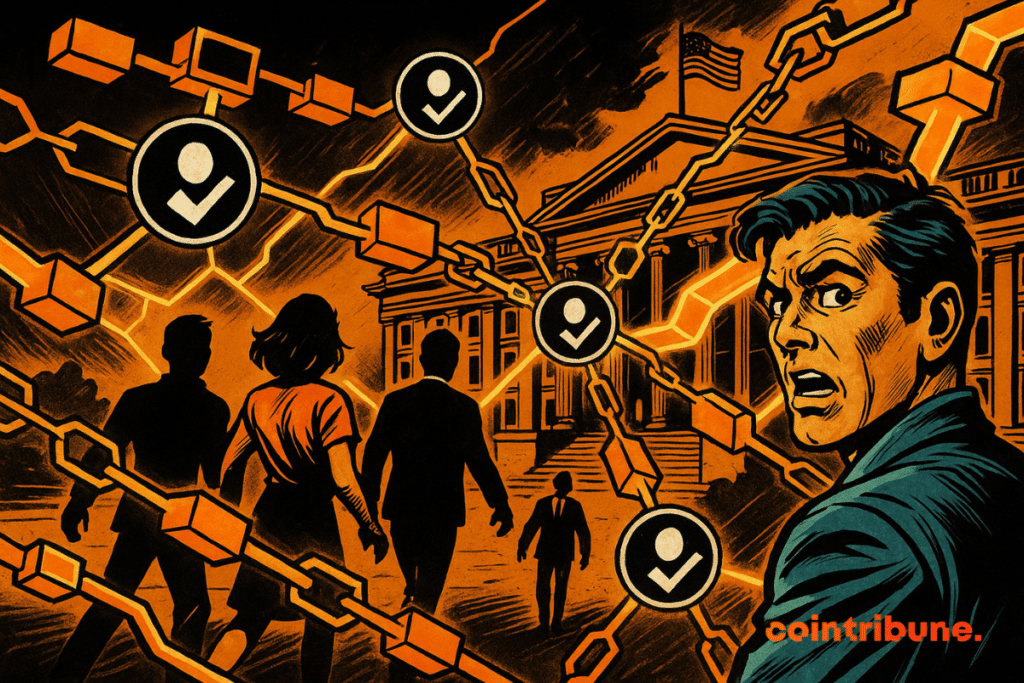U.S. Set to Overhaul Decentralized Finance (DeFi) from the Ground Up
Is decentralized finance living its last hours of freedom in the United States? Since July, the crypto industry has been at the center of a vast regulatory project led by the U.S. Treasury. The goal? To end transaction anonymity on DeFi platforms in the name of combating money laundering and terrorist financing. But by imposing digital identity systems, are authorities not risking sacrificing privacy and the very essence of DeFi? The debate is underway.

In Brief
- The U.S. Treasury wants to integrate KYC into smart contracts of DeFi protocols.
- The official goal is to counter terrorist financing and money laundering.
- Tools like AI or APIs will also be used to strengthen controls.
- The project is under public consultation until October 17, 2025, with crypto stakeholders.
The U.S. Treasury Wants to Code Compliance into Smart Contracts
Within the framework of the GENIUS Act, signed in July by Donald Trump, the U.S. Treasury launched a public consultation that could disrupt decentralized finance. It proposes inserting identity verification mechanisms directly into DeFi smart contracts. Yes, you read that right.
Specifically, this means that any user could be required to prove their identity before validating a transaction. And this, thanks to “wearable digital identifiers” integrated into the code.
According to the official notice:
Digital identity verification (also known as identity proofing) is the process of establishing and verifying that a person is who they claim to be in a digital context. Treasury is aware of several efforts in the digital asset industry to develop portable digital identity credentials designed to support various elements of AML/CFT and sanctions compliance, maximize user privacy, and reduce compliance burden on financial institutions. These tools can incorporate different pieces of information, such as government-issued identity documents or biometrics, and can vary by operational models, governance, and convenience.
Banks applaud, crypto purists would grind their teeth. For them, this coded KYC obligation could signal the end of anonymity on protocols.
United States and Crypto: Towards a New Surveillance Pact?
The Treasury doesn’t stop there. In the same call for comments, four technologies are mentioned: artificial intelligence, surveillance APIs, blockchain analysis, and of course, digital identity.
Why this shift? Because the crypto market represents a massive reservoir… of risks as well. The Treasury cites money laundering, sanctions evasion, ransomware.
And for the first time, authorities want these tools to be native, integrated into crypto infrastructures.
In the press release:
Treasury is conscious, however, that innovative tools may present new resource burdens for financial institutions upon introduction due to costs to acquire and integrate new tools and to building necessary expertise. Financial institutions may also face difficulties using these tools effectively, especially at early stages of use, due to their novel nature.
In clear terms, the United States seeks to code regulation into DeFi itself. The message is clear: technology must no longer bypass the law. And anonymity becomes a privilege to reconsider.
The Crypto Sphere Facing the U.S. Steamroller
The crypto community does not hide its concern. On X, critical voices are multiplying. Some warn of a dangerous precedent: if the US imposes universal KYC in DeFi, other countries will follow. Others see it as a brake on innovation and a weakening of personal data protection.
On the banking side, the mood is entirely different. The Bank Policy Institute (BPI), grouping several major institutions, warned Congress against a loophole in the GENIUS Act. According to them, some stablecoin issuers could circumvent the ban on paying interest.
Focus on the numbers and facts:
- The BPI estimates that up to 6,600 billion dollars in bank deposits could migrate to stablecoins;
- The Treasury launched its public consultation on August 18, 2025;
- Comments are open until October 17, 2025;
- Four targeted tools: API, AI, blockchain surveillance, digital identity;
- The proposal concerns all platforms offering DeFi services in the United States.
This project marks a break. The American approach is to bring DeFi under regulatory perimeter through technology. And that changes everything.
Senator Elizabeth Warren did not mince her words: this plan weakens transparency instead of strengthening it. For her, the GENIUS Act risks legitimizing opaque practices under the guise of innovation. One thing is certain: the United States no longer wants decentralized finance out of control. It remains to be seen if the rest of the world will follow.
Maximize your Cointribune experience with our "Read to Earn" program! For every article you read, earn points and access exclusive rewards. Sign up now and start earning benefits.
La révolution blockchain et crypto est en marche ! Et le jour où les impacts se feront ressentir sur l’économie la plus vulnérable de ce Monde, contre toute espérance, je dirai que j’y étais pour quelque chose
The views, thoughts, and opinions expressed in this article belong solely to the author, and should not be taken as investment advice. Do your own research before taking any investment decisions.